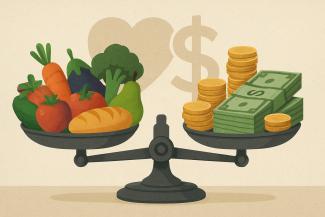
Calories in Dollars out
I’ve never met someone who is in recovery from food or money. It can be a sobering experience to realize that not everything that has the potential for abuse can be avoided. Some things can be quit cold turkey, but food and money are ubiquitous. The long-term consequences that come from an unhealthy relationship with food or money can be avoided if we stop trying and failing to be perfectly rational and settle for reasonable.
Our brains are wired by evolution to seek immediate rewards. When it comes to food and money, there’s big business behind separating you from your dollars or pushing ultra processed quick fixes. We make thousands of decisions a day, and as we do our capacity to make good decisions becomes fatigued. Without some level of planning, we will be continually put in positions where the easiest decisions to make may not be the best for you in the long term.
The onus of curbing your behavior is shifting more toward the consumer when it comes to finance. This means that strategies that enable you to make better decisions will become increasingly more important for your financial health. In the last decade the FDA banned trans fats[i] and GLP-1’s are proving to be a powerful tool in curbing bad behavior around food habits while Buy Now Pay Later[ii] proliferates and the Consumer Financial Protection Bureau’s is set to lose nearly half its funding[iii].
When it comes to personal finance, there are many parallels with diet and exercise. You can’t live without food, and you can’t participate in society without money. Food and money are necessary, but they’re also tied to emotions in ways that complicate our relationships with them. Since these are things that can’t be eliminated, we either find a balance or suffer the long-term consequences.
With food we have diet and exercise, with money we have income and expenses. With either, there are many ways to position yourself for solid long-term results, but there are some common throughlines. If you consume more calories than you burn or spend more money than you earn you’ll be fat, and your wallet will be skinny. There are tons of opinions about which diet might be “best” but those are always going to be subjective. Diets also need to be followed, a “perfect” diet is useless if you won’t stick to it, but a reasonable diet you can stick with could give you fantastic results over time. Similarly, if a portfolio or budget isn’t something you can stick with it’s irrelevant how effective it could have been.
As humans we like to think we’re rational, but reality shows us otherwise[iv]. Sticking to something reasonable will always yield better results than giving up on something rational.
There are plenty of complex diets that could yield results but at the end of the day your habits over time will determine your outcome. How can you improve your habits with money? What good things can you automate? How can you make it easier to do what’s in the best interest of future you? How can you design your environment to have the path of least resistance still be leading you in the right direction.
Image Attribution
Illustration created by AI for explanatory purposes. A balanced scale with food on one side and money on the other, symbolizing the need to find equilibrium between essential nourishment and financial priorities.
[i] https://www.fda.gov/food/food-additives-petitions/trans-fat
[ii] https://www.foxbusiness.com/media/expert-warns-looming-credit-catastrophe-could-wreck-your-score-2025

